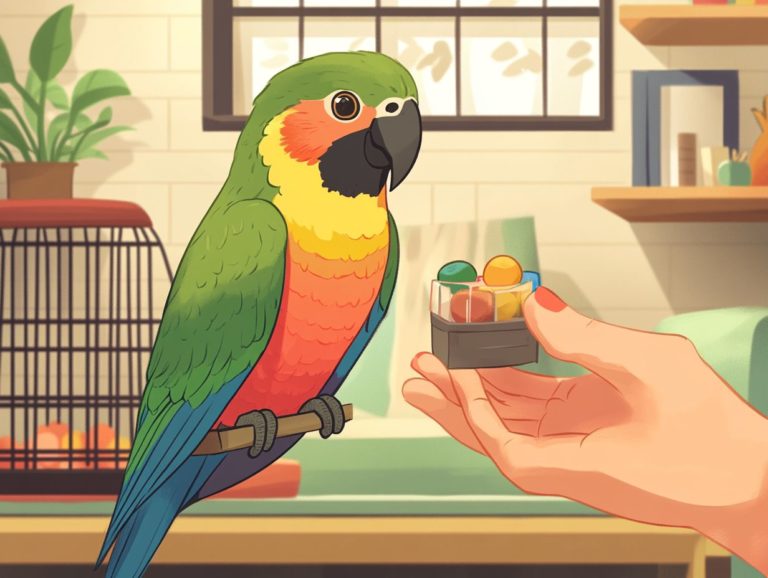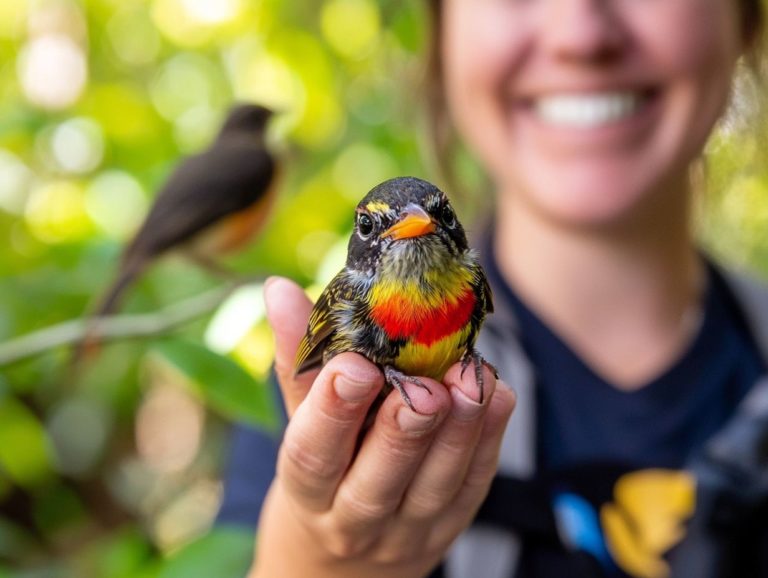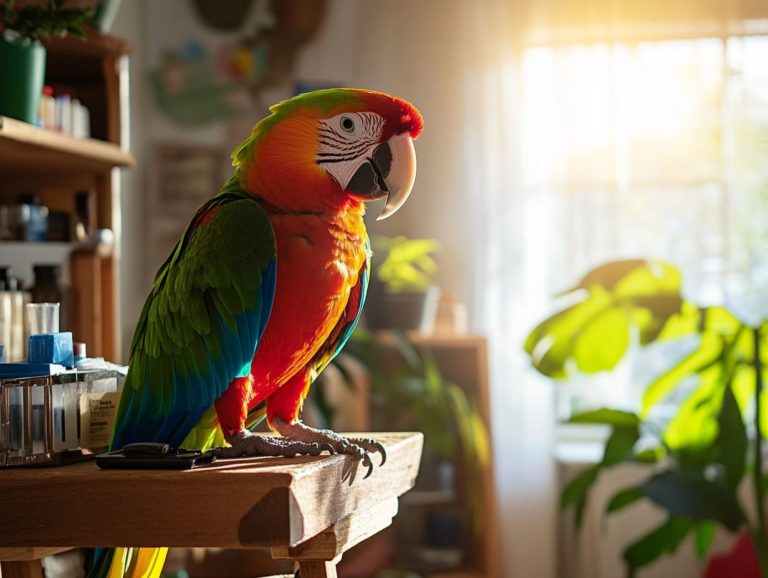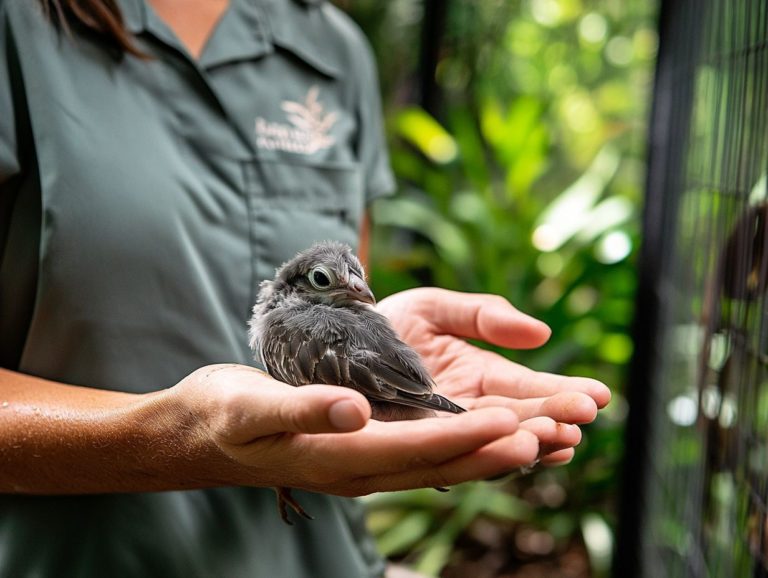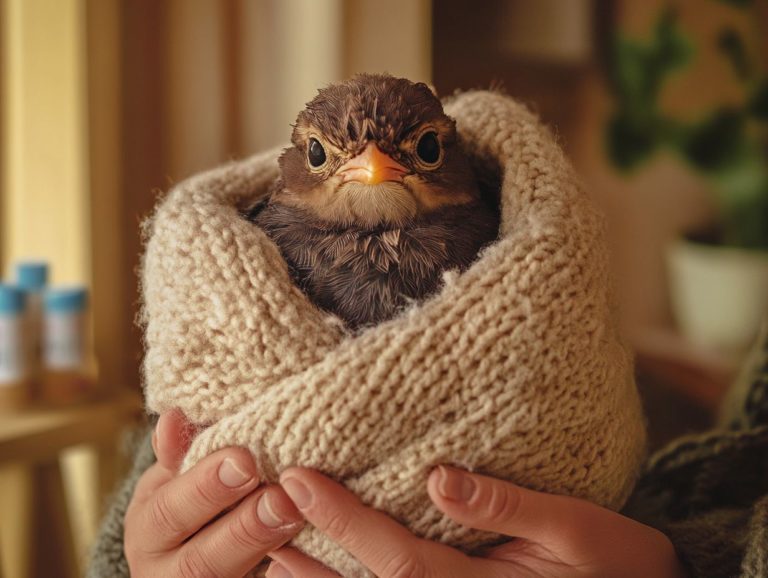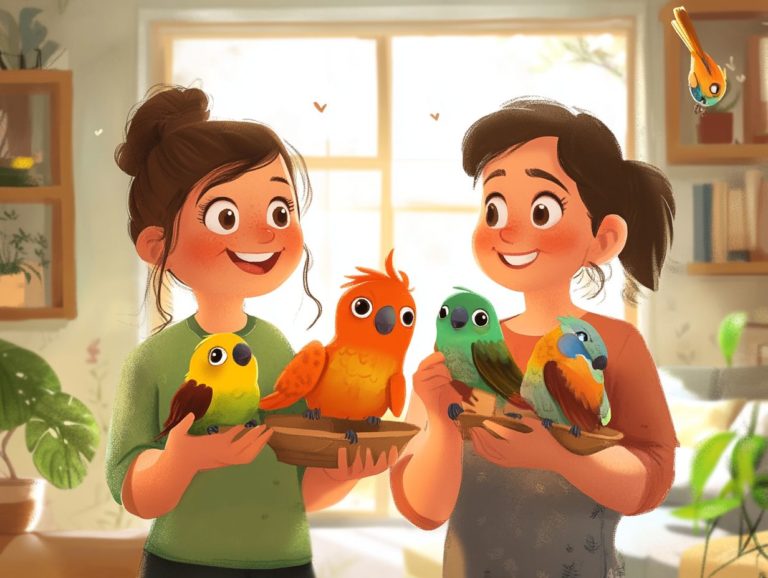Understanding the Needs of Rescued Birds
Caring for rescued birds offers a distinctive blend of challenges and rewards that can profoundly transform both the bird s life and yours!
From grasping their nutritional needs to ensuring they receive the right stimulation and health care, every detail is crucial to their rehabilitation.
Crafting an appropriate environment, participating in training and socialization, and skillfully handling the challenges that may arise are essential steps in this fulfilling journey.
Dive in as you discover how to provide these beautiful creatures with the second chance they truly deserve!
Contents
- Key Takeaways:
- Types of Rescued Birds
- Common Needs of Rescued Birds
- Creating a Suitable Environment for Rescued Birds
- Training and Socialization for Rescued Birds
- Challenges and Rewards of Caring for Rescued Birds
- Frequently Asked Questions
- What do birds need?
- How can I determine the right living environment for a rescued bird?
- What nutrition do rescued birds require?
- Do rescued birds require regular veterinary care?
- How can I provide mental and physical stimulation for a rescued bird?
- What should I do if I’m unsure of a rescued bird’s needs?
Key Takeaways:
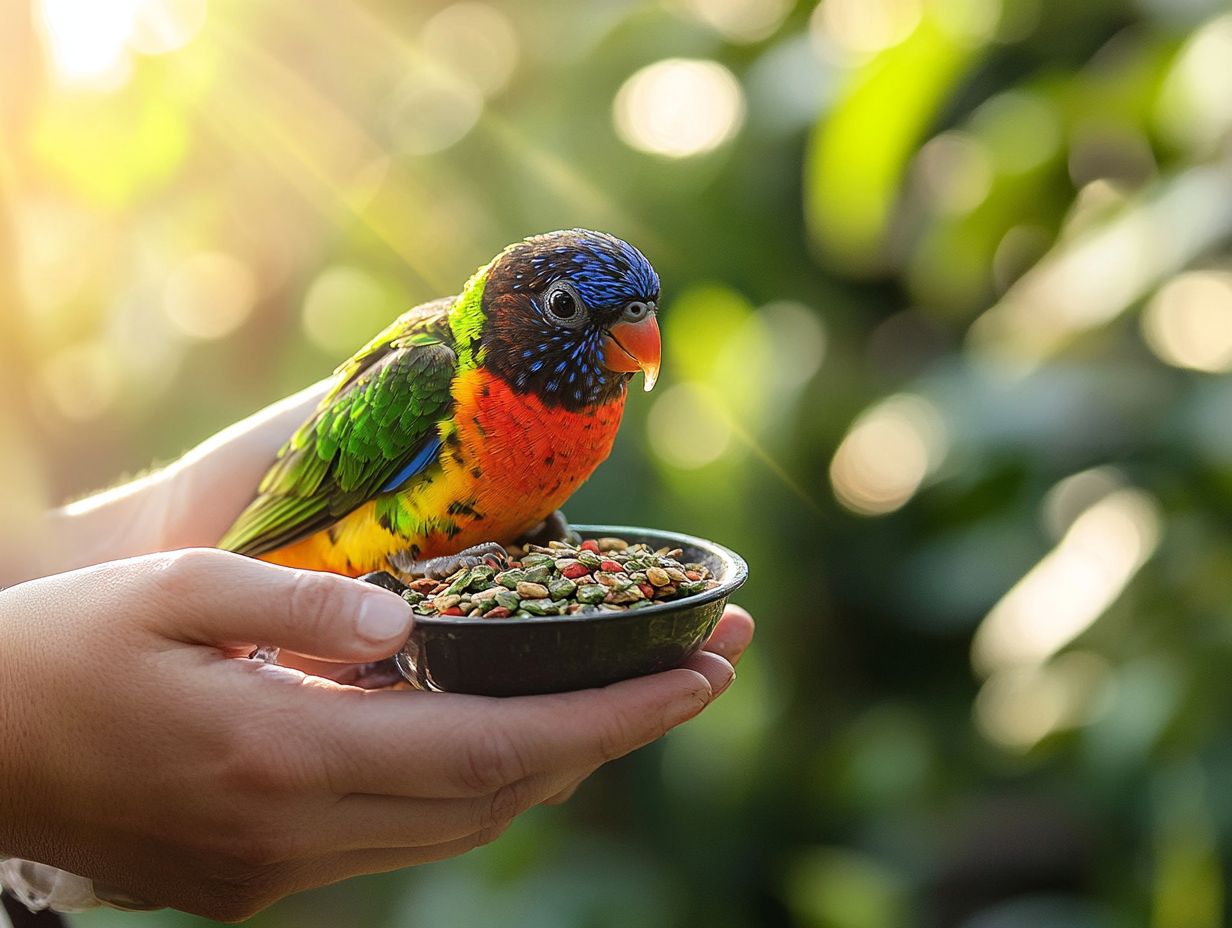
- Proper nutrition and diet are crucial for the health of rescued birds.
- Creating a stimulating environment with appropriate cage size, placement, and enrichment can improve the well-being of rescued birds.
- Training and socialization, including building trust and providing opportunities for interaction, can help rescued birds thrive in their new homes.
Types of Rescued Birds
When contemplating the addition of a new winged companion to your cherished home, it’s vital to familiarize yourself with the diverse array of rescued birds available for adoption.
Each species, from the intelligent African Grey Parrot to the charming Budgie, the affectionate Lovebird, the lively Finch, and the delightful Cockatiel, not to mention the spirited Parrotlet, the melodious Canary, the captivating Pionus Parrot, and the majestic Macaw, comes with its own unique needs and personalities.
Grasping these differences is essential, especially for first-time bird owners, as it allows you to determine which feathered friend will harmonize with your lifestyle and flourish in a safe, nurturing environment.
Common Needs of Rescued Birds
Rescued birds come with their own unique set of needs, which may vary by species, but one thing is certain: they all require attentive care to truly flourish in a nurturing environment. Understanding the nutritional needs of parrots is essential for their well-being.
It’s vital to address their emotional well-being, health, and nutrition to foster trust and companionship. Be aware of potential behavioral issues and recognize when to seek veterinary assistance (a doctor for birds) to greatly elevate their overall quality of life.
Nutrition and Diet
Providing a balanced and nutritious diet is essential for caring for rescued birds, ensuring their health and vitality. By adopting the right feeding regimen comprising high-quality pellets, fresh fruits, vegetables, and occasional treats you can significantly enhance their overall well-being and longevity.
Different species of rescued birds, such as parrots, canaries, and finches, each come with unique dietary requirements that must be met to promote optimal nutrition. For instance, parrots thrive on a delightful mix of seeds, nuts, and leafy greens, while finches may find more benefit in a seed-based diet, generously supplemented with vegetables.
Maintaining a structured feeding schedule is crucial for their digestive health and encourages natural foraging behaviors, which keeps them engaged and active. The importance of consulting with a veterinarian cannot be emphasized enough; they can provide tailored dietary recommendations specific to each bird s health status and nutritional needs, ultimately enhancing their overall care.
Physical and Mental Stimulation
Physical and mental stimulation are crucial for the well-being of rescued birds, as they help address both behavioral and emotional needs. By engaging your feathered friends with toys, social interaction, and ample flight time, you can prevent behavioral issues and significantly enhance their quality of life.
Creating an enriching environment that encourages exploration and play is essential, tailored to the unique personalities of each bird. You can achieve this by providing a selection of safe, interactive toys that stimulate their natural instincts and social needs, alongside a routine that includes daily bonding sessions.
Neglecting these play needs can lead to frustration and anxiety, which often manifest as destructive behaviors. Social interaction not only fosters emotional support but also strengthens the bond between you and your avian companion, ensuring that both of you enjoy a fulfilling and balanced relationship.
Health and Veterinary Care
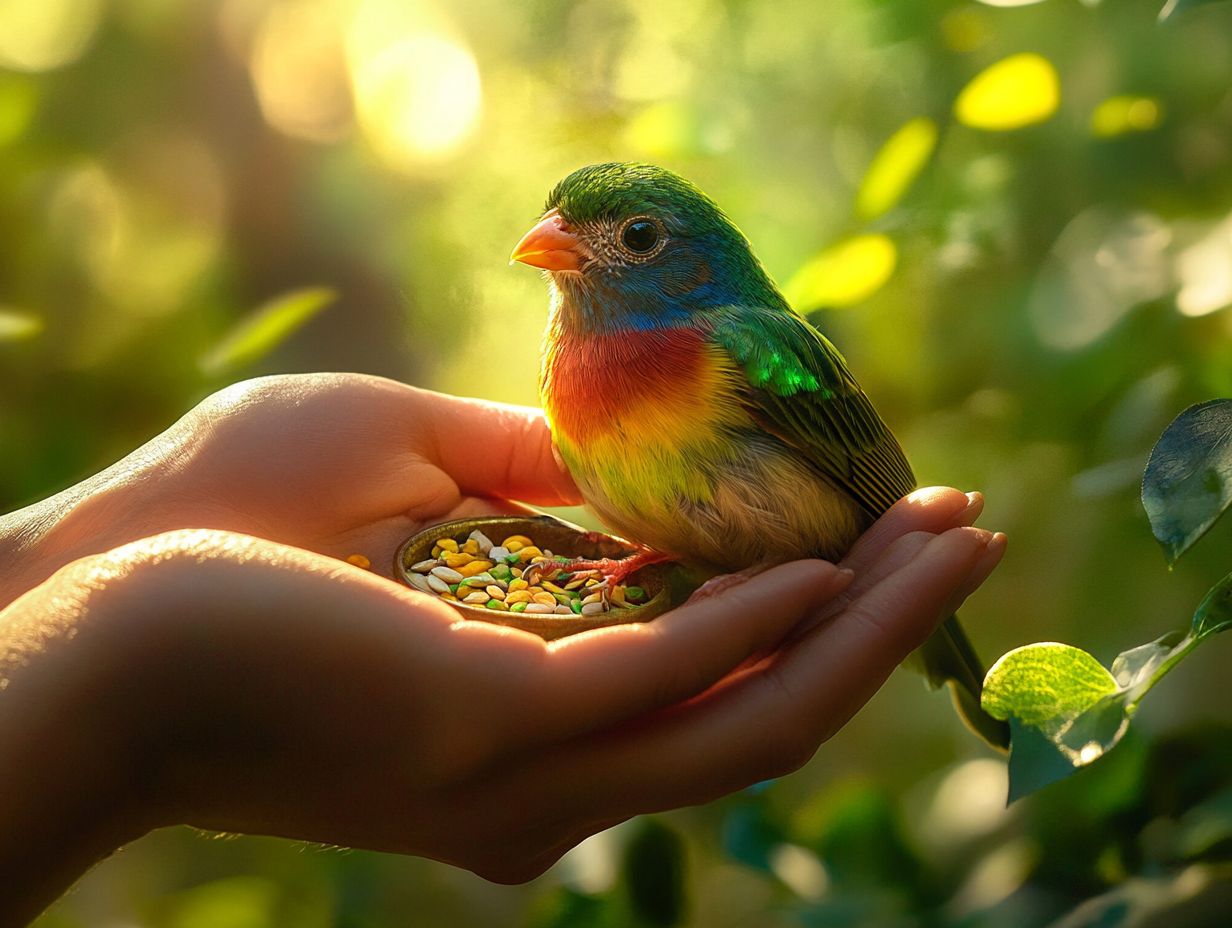
Regular health check-ups and veterinary care are essential for ensuring the well-being of your rescued birds. These visits help address any behavioral issues or emotional needs early on.
Building a strong relationship with an avian veterinarian a doctor who specializes in birds can significantly improve your birds’ health and extend their lifespan.
Routine visits help catch health issues before they escalate. They also provide a valuable opportunity for you to learn about the specific food needs and environmental needs unique to your bird’s species.
For example, different birds have their own set of nutritional requirements and susceptibility to certain diseases. Preventive care is crucial to ensuring their health. Early intervention in behavioral problems can improve your birds emotional well-being, creating a happier and more harmonious home.
You can make a real difference in your bird’s life by being a responsible owner!
Creating a Suitable Environment for Rescued Birds
Crafting an ideal environment for rescued birds is fundamental to their well-being and happiness. Start by selecting the right birdcage that meets their space needs.
Bird-proofing your space and ensuring outdoor safety are vital steps in creating a sanctuary where these magnificent creatures can truly flourish.
Cage Size and Placement
Selecting the right cage size and placement for your rescued bird is essential for their comfort and safety. Ample space allows them to move around and engage in natural behaviors.
A well-placed cage can also enhance your bird’s interaction with your family, promoting a healthy bond.
When considering cage sizes, keep in mind that larger species like macaws need a minimum of 3 feet wide and 5 feet tall. In contrast, smaller birds like budgies can thrive in cages as compact as 2 feet wide and 2 feet tall.
But it s not just about dimensions; the cage should be furnished with perches, toys, and safe materials. This caters to each bird’s emotional needs.
Positioning the cage in a lively area, away from drafts and direct sunlight, allows your bird to observe daily activities. This creates a stimulating environment that helps reduce stress.
A safe and lively space is crucial for your bird s happiness and health!
Enrichment and Toys
Providing proper enrichment and a variety of toys for rescued birds satisfies their need for play. It also helps to mitigate potential behavioral issues and psychological challenges.
Engaging toys, such as foraging puzzles and swings, stimulate their minds and encourage active play.
Different bird species have unique preferences and requirements for enrichment activities.
- Cockatiels often enjoy simple bells and mirrors that cater to their social nature.
- Parrots might need more complex toys that challenge their intellect, like interlocking shapes or treat-dispensing devices.
Having a diverse assortment of toys can alleviate boredom and reduce unwanted behaviors. Incorporating natural elements, such as branches for climbing and shredding materials, keeps them mentally engaged.
Understanding these individual play needs is crucial for creating a happy, enriching environment for your feathered friends.
Training and Socialization for Rescued Birds
Training and socialization are essential for the well-being of rescued birds. They help them acclimate to their new surroundings while building trust and companionship with you.
By committing to consistent training practices, you can strengthen the bond with your feathered friends and enrich their quality of life.
Building Trust and Bonding
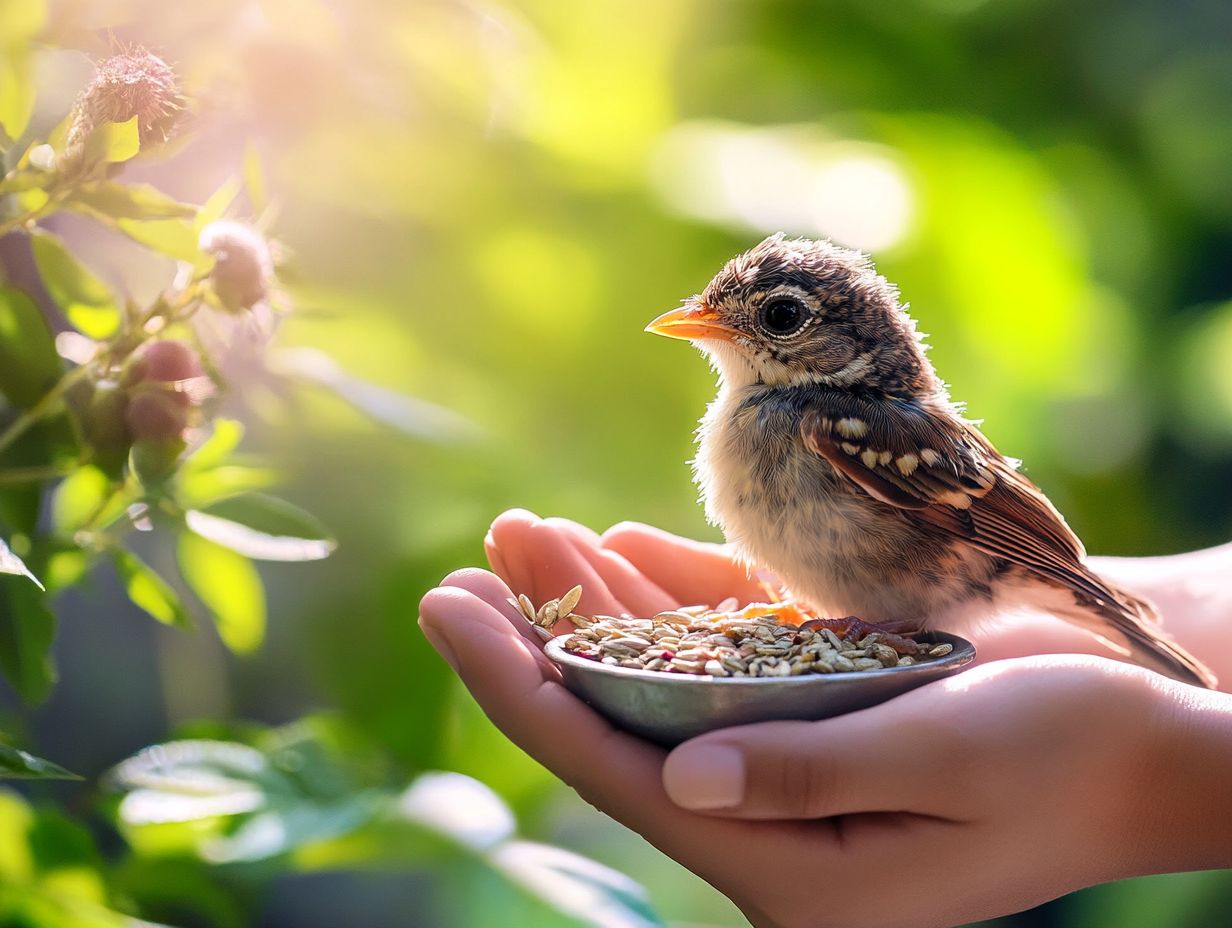
Building trust and forming a bond with rescued birds requires patience and understanding. This journey leads to a profound emotional connection.
Engaging in training techniques that reward good behavior can significantly enhance this bond. This ensures your feathered companion feels safe and secure.
Create an environment that nurtures comfort and trust. Each interaction should be gentle, inviting exploration and allowing the bird to approach at its own pace.
Utilizing treats and verbal praise during training sessions reinforces desired behaviors while deepening your relationship. Pay attention to the bird’s signals that show how it feels to guide you in offering the right kind of support.
Over time, these techniques will turn any hesitation into a rewarding companionship, enriching the emotional lives of both you and your bird.
Interacting with Other Birds and Humans
Facilitating interactions between rescued birds and humans, as well as with other birds, is essential for their socialization and emotional well-being. Proper social engagement helps mitigate potential behavioral issues and allows the birds to develop healthy flock dynamics.
These interactions enhance their ability to bond with others and provide invaluable opportunities for enrichment. When integrating rescued birds into new environments, consider adopting gradual introductions to ensure they feel safe and secure.
Pay attention to their body language to reveal comfort levels. Creating structured settings for interaction will nurture their social skills.
By fostering a supportive atmosphere filled with varied companionship both human and avian you enable the rescued birds to flourish. This ultimately leads to harmonious coexistence and improved mental health.
Remember, trust is fundamental in establishing strong bonds. Start building that bond today!
Challenges and Rewards of Caring for Rescued Birds
Caring for rescued birds presents a distinct blend of challenges and rewards that you should embrace. From tackling behavior issues to recognizing the emotional needs of these feathered companions, the journey may be intricate.
Yet, it offers profound fulfillment as you cultivate a nurturing environment for them, making proper care essential.
Common Difficulties and How to Overcome Them
Caring for rescued birds comes with its own set of challenges, particularly behavior issues that may arise from past trauma or insufficient socialization. You’ll need to address these challenges with care and understanding.
Recognizing their emotional needs and employing effective training techniques can help you overcome these hurdles. It’s not uncommon for rescued birds to show signs of stress, such as excessive vocalization or reluctance to engage with humans.
These behaviors often point to deeper emotional struggles that require your patience and empathy. To help your feathered friends adjust, create a safe and quiet environment that allows them to acclimate at their own pace.
Positive reinforcement training is a powerful tool for building trust and encouraging desirable behaviors. Offer enriching toys, ensure regular social interaction, and keep a consistent routine to address their emotional needs.
This will foster a sense of security that is vital for their overall well-being. Don t wait create that safe environment now for your rescued bird!
The Joy of Giving a Rescued Bird a Second Chance
Giving a rescued bird a second chance at life is a unique experience. It fills your heart with immense satisfaction and companionship.
Each feathered friend has its own personality, making every interaction a delightful adventure. As they adapt to their new surroundings, the bond that develops can become incredibly profound, leading to a relationship filled with trust and affection.
Witnessing a rescued bird flourish under your care not only enhances your living space but also cultivates a sense of purpose. Sharing your life with these amazing creatures can lead to unexpected moments of joy and laughter, serving as constant reminders of resilience and the beauty of second chances.
Frequently Asked Questions
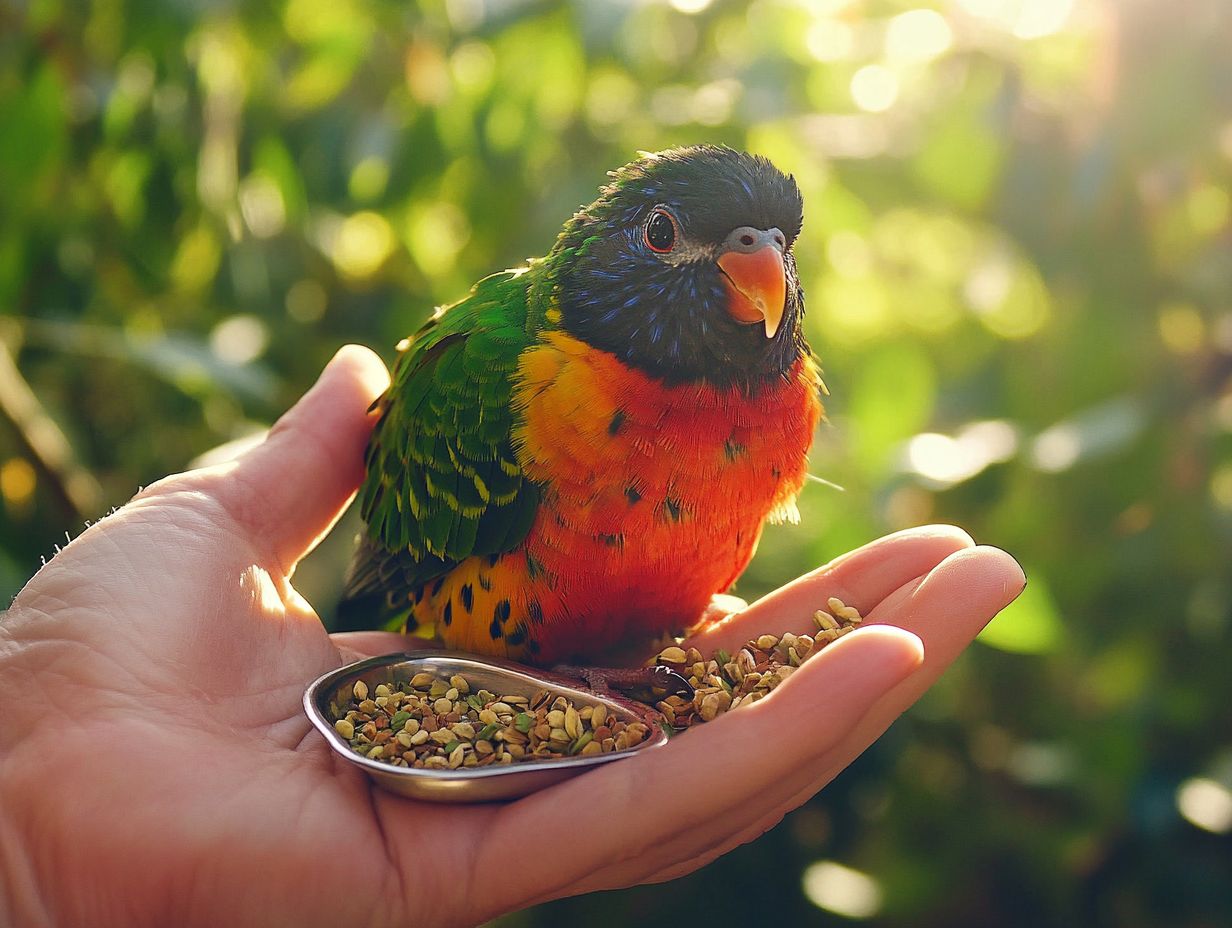
What do birds need?
The needs of rescued birds can vary depending on the different types of birds, but they generally require a safe and suitable living environment, proper feeding, and adequate stimulation.
How can I determine the right living environment for a rescued bird?
The living environment for a rescued bird should mimic its natural habitat as closely as possible. Provide a suitable cage or aviary with enough space for the bird to move and fly around. Include appropriate perches and toys for mental stimulation.
What nutrition do rescued birds require?
Rescued birds should be fed a well-balanced and varied diet that meets their specific nutritional needs. This may include a mix of seeds, pellets, fresh fruits and vegetables, and occasional treats, depending on the species.
Do rescued birds require regular veterinary care?
Yes, rescued birds need regular check-ups and any necessary medical care from a qualified avian veterinarian. It s crucial for maintaining their overall health and catching potential issues early.
How can I provide mental and physical stimulation for a rescued bird?
Rescued birds need mental and physical stimulation to stay healthy and happy. Offer various toys, puzzles, and activities for the bird to engage in. Spend quality time interacting and playing with them.
What should I do if I’m unsure of a rescued bird’s needs?
If you re unsure of a rescued bird’s specific needs, consult a qualified avian veterinarian or a reputable bird rescue organization. They can provide the guidance you need to ensure the best care for the bird.
Consider adopting or supporting bird rescue efforts today. Every bit helps these wonderful creatures find their forever homes!

